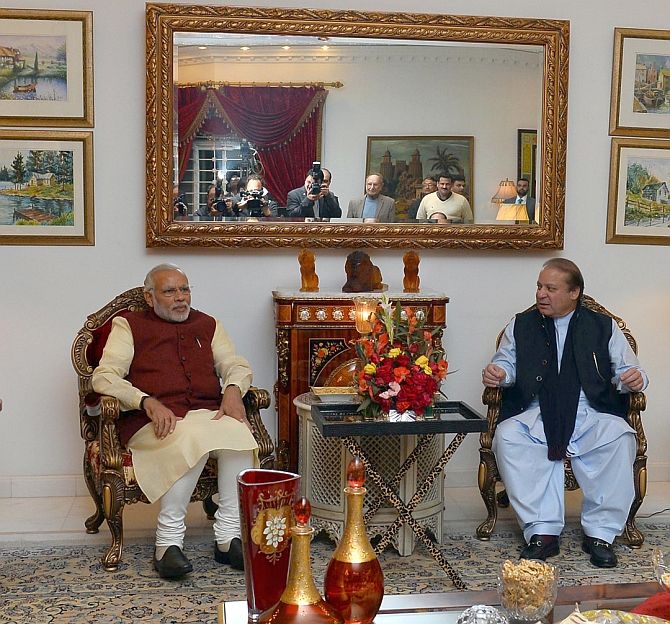'Will Prime Minister Narendra Modi be able to continue political engagement with Pakistan against the inevitable upsurge of negative and hostile public sentiment?'
'Would he be able to maintain a careful balance between measured retaliation and continued engagement? There is reason to be doubtful on this score,' says former foreign secretary Shyam Saran.

Prime Minister Narendra Modi's brief visit to Lahore is not as much of a surprise as it may appear at first sight.
A series of initiatives he has taken towards Pakistan since his invitation to his Pakistani counterpart for his swearing in ceremony last year, fall into a recognisable pattern.
Right through the impasse caused by the mis-steps of his aides, through the continuing violence across the border and the exchange of aggressive rhetoric, the prime minister has been remarkably consistent in losing no opportunity to reach out to Nawaz Sharif and keep lines of communication open at all times.
In this, he shares the conviction of his predecessors, Atal Bihari Vajpayee and Dr Manmohan Singh, that there is no alternative to engagement with Pakistan and that heightened tensions with Pakistan constrain India's ability to play a larger regional and global role.
These former leaders were both conscious of the fact that India-Pakistan tensions create space for intervention by major powers, in particular the United States and China.
However, both were unable to sustain the engagement against the impact of serious cross-border terrorist attacks.
The past decade-and-a-half has been an unproductive saga of dialogue-disruption-dialogue and this pattern appeared to continue until recently with Modi as well.
However, what may have changed is the pursuit of a two-track approach: keeping up military pressure on the border and engaging in a more active diplomacy to constrain Pakistan's room for manoeuvre, even while seeking opportunities for engagement and dialogue.
The stopover in Lahore came after a high-profile visit to Kabul and a clear projection of intent to maintain and to expand India's presence in that country despite Pakistani reservations.
Vajpayee and Manmohan Singh were driven by the vision of a 'grand reconciliation' between two estranged members of the same family.
Modi appears more realistic in his expectations, aiming at managing an adversarial relationship through constant engagement and confidence building measures, rather than seeking to resolve difficult outstanding issues such as Kashmir.
Another difference in Modi's approach to Pakistan, and this is true of his approach to foreign relations in general, is his belief in the value of personal diplomacy.
We have seen this most clearly in his deliberate effort to build a personal equation with Obama and with Shinzo Abe, in which he seems to have been more successful and with China's Xi Jinping, which may have been less successful.
There is little doubt that Modi sees his personal interaction with Sharif as more effective in creating openings for improving bilateral relations.
But then, Nawaz Sharif is not the final arbiter on relations with India. The Pakistani army is.
Perhaps on another occasion he may reach out to the other Sharif. One should not rule that out.
Modi has been ready to expend significant political capital in pursuing his Pakistan policy.
He has crossed the red lines he himself had drawn and has been open to the charge of ploughing the same furrow which he had condemned the previous government for.
If he is able to succeed in imparting a degree of normalcy in bilateral relations and enable mutually beneficial economic and commercial relations, the risk would have been worth taking.
The real test will come if, as on previous occasions, a high-profile, though mainly atmospheric, event such as this Lahore visit is followed by a spate of ceasefire violations or another serious cross-border terrorist outrage.
Will Modi be able to continue political engagement with Pakistan against the inevitable upsurge of negative and hostile public sentiment? Would he be able to maintain a careful balance between measured retaliation and continued engagement? There is reason to be doubtful on this score.
There is, in fact, a danger that the very reliance on high-profile personal diplomacy may trigger a hostile reaction among the Pakistani army and the jihadi groups who have much to lose even from a limited improvement in India-Pakistan relations.
There are elements in India, too, including among Modi's own political constituency, who would only be too ready to fault him, should there be a repeat of previous negative experiences.
The Kargil episode after Vajpayee's historic visit to Lahore is a warning that must not be forgotten. It is more prudent to pursue, discretely, incremental though modest measures which over time may cumulatively lead to a substantive improvement of relations.
It is good that Modi has opened the door further ajar with his latest visit. Now, let this be followed by patient negotiations, away from public glare, in the Comprehensive Dialogue that is to commence in the near future."
Shyam Saran -- a former foreign secretary -- is currently chairman, Research and Develping System for Developing Countries, and Senior Fellow, Center for Policy Research.
Image: Prime Minister Narendra Modi with his Pakistani counterpart Nawaz Sharif, at Raiwind, in Pakistan. Photograph: Press Information Bureau












 © 2025
© 2025